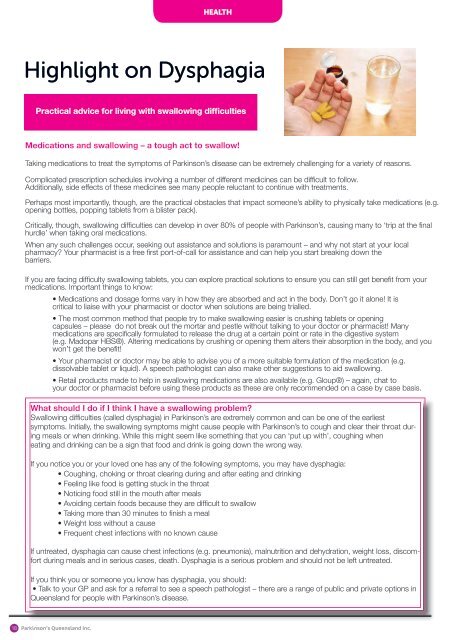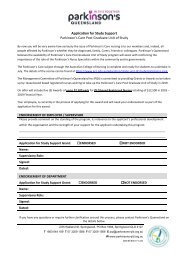Connections | Issue 1 2018
You also want an ePaper? Increase the reach of your titles
YUMPU automatically turns print PDFs into web optimized ePapers that Google loves.
HEALTH<br />
Highlight on Dysphagia<br />
Practical advice for living with swallowing difficulties<br />
Medications and swallowing – a tough act to swallow!<br />
Taking medications to treat the symptoms of Parkinson’s disease can be extremely challenging for a variety of reasons.<br />
Complicated prescription schedules involving a number of different medicines can be difficult to follow.<br />
Additionally, side effects of these medicines see many people reluctant to continue with treatments.<br />
Perhaps most importantly, though, are the practical obstacles that impact someone’s ability to physically take medications (e.g.<br />
opening bottles, popping tablets from a blister pack).<br />
Critically, though, swallowing difficulties can develop in over 80% of people with Parkinson’s, causing many to ‘trip at the final<br />
hurdle’ when taking oral medications.<br />
When any such challenges occur, seeking out assistance and solutions is paramount – and why not start at your local<br />
pharmacy? Your pharmacist is a free first port-of-call for assistance and can help you start breaking down the<br />
barriers.<br />
If you are facing difficulty swallowing tablets, you can explore practical solutions to ensure you can still get benefit from your<br />
medications. Important things to know:<br />
• Medications and dosage forms vary in how they are absorbed and act in the body. Don’t go it alone! It is<br />
critical to liaise with your pharmacist or doctor when solutions are being trialled.<br />
• The most common method that people try to make swallowing easier is crushing tablets or opening<br />
capsules – please do not break out the mortar and pestle without talking to your doctor or pharmacist! Many<br />
medications are specifically formulated to release the drug at a certain point or rate in the digestive system<br />
(e.g. Madopar HBS®). Altering medications by crushing or opening them alters their absorption in the body, and you<br />
won’t get the benefit!<br />
• Your pharmacist or doctor may be able to advise you of a more suitable formulation of the medication (e.g.<br />
dissolvable tablet or liquid). A speech pathologist can also make other suggestions to aid swallowing.<br />
• Retail products made to help in swallowing medications are also available (e.g. Gloup®) – again, chat to<br />
your doctor or pharmacist before using these products as these are only recommended on a case by case basis.<br />
What should I do if I think I have a swallowing problem?<br />
Swallowing difficulties (called dysphagia) in Parkinson’s are extremely common and can be one of the earliest<br />
symptoms. Initially, the swallowing symptoms might cause people with Parkinson’s to cough and clear their throat during<br />
meals or when drinking. While this might seem like something that you can ‘put up with’, coughing when<br />
eating and drinking can be a sign that food and drink is going down the wrong way.<br />
If you notice you or your loved one has any of the following symptoms, you may have dysphagia:<br />
• Coughing, choking or throat clearing during and after eating and drinking<br />
• Feeling like food is getting stuck in the throat<br />
• Noticing food still in the mouth after meals<br />
• Avoiding certain foods because they are difficult to swallow<br />
• Taking more than 30 minutes to finish a meal<br />
• Weight loss without a cause<br />
• Frequent chest infections with no known cause<br />
If untreated, dysphagia can cause chest infections (e.g. pneumonia), malnutrition and dehydration, weight loss, discomfort<br />
during meals and in serious cases, death. Dysphagia is a serious problem and should not be left untreated.<br />
If you think you or someone you know has dysphagia, you should:<br />
• Talk to your GP and ask for a referral to see a speech pathologist – there are a range of public and private options in<br />
Queensland for people with Parkinson’s disease.<br />
18<br />
Parkinson’s Queensland Inc.




